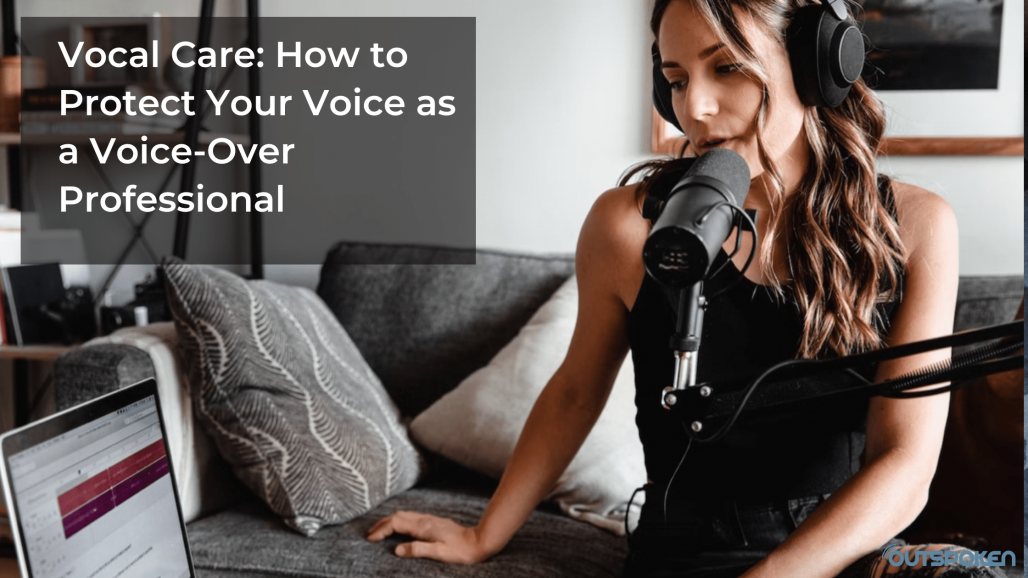Learn what makes a voice sound natural, how to brief voice-over talent effectively, and practical ca...
Vocal Care: How to Protect Your Voice as a Voice-Over Professional

Taking care of your body is essential no matter your career, but if you’re a voice-over artist, your voice is your most crucial instrument as a professional. This is why, it’s incredibly important to be proactive and ensure you follow these recommended steps to keep it healthy.
Why You Should Protect Your Voice
As a voice-over actor, your voice is at the centre of your job. To guarantee its longevity, you know you need to warm up and speak in a particular manner. Some people might think, “well, I talk all the time, and I have no issue”.
However, when you do voice-over at a professional level, you need to take things a little more seriously. Many actors don’t give their voices enough rest, this is especially the case when they’re working from home and have their own recording studio. Actors with home studios tend to spend more time in their booths auditioning for various projects or simply working on their craft between paid recording sessions.
Vocal health planning is something that needs to be adapted to each person. Only you know your limits. However, there are some basic rules everyone can follow to maintain the longevity of your voice.
How to Take Care of Your Voice: Three Easy Tips
There are three easy things you can do to keep your voice health in check. Let’s go through them in some more detail and explain why they are so crucial for VO talent.
Hydration
One of the most important considerations when thinking about vocal care is ensuring your vocal cords are always moist (and warmed up!). Hydration can help keep them supple, allow them to vibrate correctly, and give your voice more fluidity.
To keep your voice hydrated, make sure you drink lots of water at room temperature. You can also use hot teas with honey and have the occasional lozenge, if you feel your throat is irritated or sore (but stay away from menthol; it can dry your throat). Never neglect vocal warm-ups; they can also help you get your day off to a great start.
Here are some vocal warm up exercises from our very own Peter Baker
Sleep and Rest
Getting enough sleep is paramount to living a healthy life, but it’s also an essential necessity to ensure your vocal cords get some rest after a hard day’s work. When you’re tired, you don’t breathe correctly, which can lead to straining your voice. Your cords are muscles, so they can get fatigued - especially if you have a long voice-over session.
Many voice-over artists work too many hours a day and don’t rest their voices enough. Make sure you get at least seven hours of sleep each night and try to take as many breaks as you can between recordings. If you can, avoid “shouty” sessions. They really put a strain on your voice. Also, do your best not to resort to caffeine, as it can have a negative effect on your cords.
A Balanced Diet
It’s also important to keep a balanced diet. If you want a strong, healthy voice, you will need a body that can endure the physical effort. In terms of what to eat, anything that can help keep your body healthy will also do wonders for your voice. Think of it like this: If you’re an athlete, you need to get ready for the long haul. The same applies to being a voice over artist.
Before a voice casting call or recording, try to avoid foods that can negatively affect your voice, such as spicy dishes, dairy products (they can cause reflux), alcohol, and soda. Ice-cold drinks and caffeinated ones are also a no-go because they can dry your vocal cords. A good alternative for breakfast could be salads or oatmeal with nuts and fruit, so your mouth doesn't feel as phlegmy.
What Not To Do
We mentioned a few things that can dry your throat and affect your voice-over work. For instance, menthol tablets and ice-cold drinks. However, there are other things you should never do if you want to ensure your vocal cords are safe and healthy, and you can apply for voice-over jobs without risking your best instrument.
Stay Away From:
- Screaming and whispering: Screaming, yelling and (you might be surprised to hear this) whispering can all be damaging to your voice. They can all create vocal tensions and negatively affect your vocal cords.
- Smoking: Excessive smoking can irritate your cords and dry the vocal cord mucosa, and result in inflammation. Not to mention, smoking can lead to changes in your voice.
- Throat clearing: Contrary to what you might think, clearing your throat can actually be quite detrimental to your voice. Instead, try drinking some water or warm tea.
- Aspirin: Taking aspirin can thin your blood. This, in turn, makes your cords more susceptible to damage.
- Environmental irritants: Dust, chemical fumes, mould, nail polish, and paint thinner are just some of the irritants that can harm your vocal cords. If you have been exposed to any of these or feel your voice is fatigued or has lost range, don’t hesitate to contact a doctor.
OutSpoken Voices is an online voice-over agency representing hand-picked artists with their own home studios. Whether it’s e-learning, corporate training, or digital marketing, OutSpoken can help connect creatives with voice-over talent. Add your voice to OutSpoken today.
Newsletter
Stay up to date with news and special offers. Get to know our new actors and features
NEED HELP?
Visit Frequently Asked Questions page or send us a question.











.png)











Comment